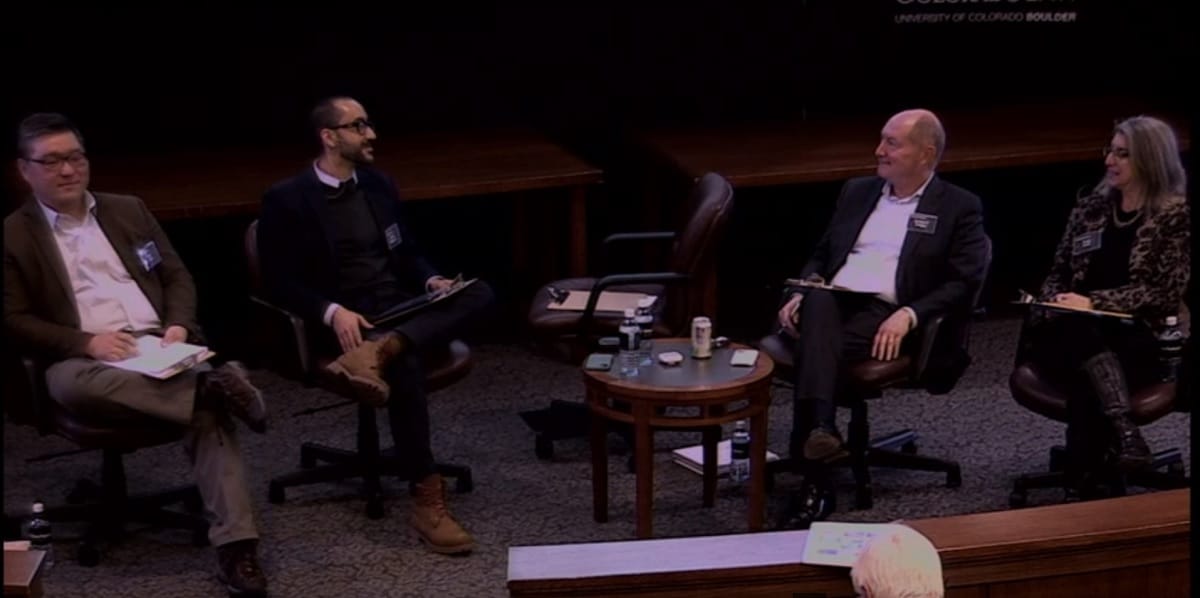Pro-Technology Advocates Change More Minds than their Anti-Tech Counterparts During Silicon Flatirons Debate
Pro-tech advocates changed more minds than their anti-tech counterparts at a Silicon Flatirons debate on Sunday. Pro-tech and anti-tech advocates engaged in an Oxford-style debate at the Silicon Flatirons conference, “Technology Optimism and Pessimism” at the University of Colorado at Boulder. Both

Pro-tech advocates changed more minds than their anti-tech counterparts at a Silicon Flatirons debate on Sunday.
Pro-tech and anti-tech advocates engaged in an Oxford-style debate at the Silicon Flatirons conference, “Technology Optimism and Pessimism” at the University of Colorado at Boulder.
Both sides tackled the question, “Is technology undermining democracy?” The debate began with an online poll of the audience (sample size of 100) posing this question, with 60 percent responding yes and 40 percent responding no.
The four combatants, two for and two against, launched into their opening arguments.
Georgetown University law professor Paul Ohm scolded “platforms that act like nation-states” and avoid taxes, and he laid the “pretty profound epistemological crisis” of deepfakes and disinformation squarely at the feet of information technology.
His ally Ahmed Ghappour, a professor at the Boston University School of Law, described the arrival of a “new dark age” and faulted the danger of technology by recounting several reports of individuals driving their car off of a cliff because they were so focused on listening to their errant GPS.
The opposing side shot back. Cindy Cohn, executive director of the Electronic Frontier Foundation, declared that “we have met the enemy, and he is us.” She implored the audience to not blame problems on the 1s and 0s of binary code. Instead, she asserted that the problem lay at the human level.
Cohn referenced two studies: One from Harvard that suggested that the Russian influencing campaign of the 2016 election was simply ineffective at changing the minds of voters, and another study that more or less demonstrated the same finding about the Cambridge Analytica misinformation campaign.
Her partner in the debate was Andrew Bridges, partner at Fenwick & West. Bridges recounted his time in Syria and how the dictator Bashir al-Assad froze social media apps to prevent protesters from coordinating logistics. He used this story to assert that the most important First Amendment freedom is actually the freedom of assembly.
The meat of the debate turned philosophical, as debaters argued over the existence of free will in today’s technological society.
Ohm pushed back against what he regarded as Cohn’s straw man argument that the anti-tech side thinks people are zombies. “We’re not zombies, but we are puppets”, responded Ohm.
Ghappour also made the poignant point that the protestors in Tahrir square, some of which he mentioned are his friends, are all either dead or in prison now due to the Syrian government’s use of surveillance technology.
Cohn countered that “a certain great organization in San Francisco” – referring to her own EFF – has been making information technology to help those same protestors.
After closing arguments, the moderator opened the results of a new audience poll: 50 percent now thought technology undermined democracy, while 50 percent did not.








